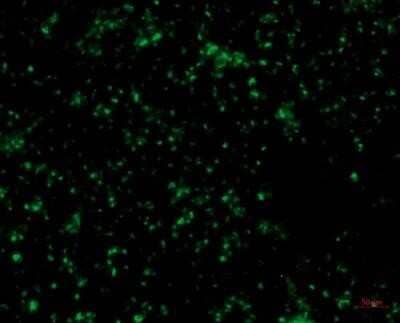Goat anti-Human IgG (H+L) Secondary Antibody [FITC]
Novus Biologicals, part of Bio-Techne | Catalog # NB7477


Conjugate
Catalog #
Key Product Details
Species Reactivity
Human
Applications
Flow Cytometry, Immunocytochemistry/ Immunofluorescence, Immunohistochemistry, Immunohistochemistry-Paraffin
Label
FITC (Excitation = 495 nm, Emission = 519 nm)
Antibody Source
Polyclonal Goat IgG
Concentration
1.0 mg/ml
Product Specifications
Immunogen
This Goat anti-Human IgG (H+L) Secondary Antibody [FITC] was developed against human IgG-heavy and light chain.
Specificity
By immunoelectrophoresis and ELISA this Goat anti-Human IgG (H+L) Secondary Antibody [FITC] reacts specifically with human IgG and with light chains common to other human immunoglobulins. No was detected against non-immunoglobulin serum proteins. This may cross react with IgG from other species.
Clonality
Polyclonal
Host
Goat
Isotype
IgG
Scientific Data Images for Goat anti-Human IgG (H+L) Secondary Antibody [FITC]
Immunocytochemistry/Immunofluorescence: Goat anti-Human IgG (H+L) Secondary Antibody [FITC] [NB7477] - Human SKCO1 cells analyzed using Goat anti-Human IgG (H+L) Secondary Antibody [FITC]. Image from verified customer review.
Applications for Goat anti-Human IgG (H+L) Secondary Antibody [FITC]
Application
Recommended Usage
Flow Cytometry
1:50 - 1:200
Immunocytochemistry/ Immunofluorescence
1:50 - 1:500
Immunohistochemistry
1:50 - 1:500
Immunohistochemistry-Paraffin
1:50 - 1:500
Reviewed Applications
Read 1 review rated 5 using NB7477 in the following applications:
Formulation, Preparation, and Storage
Purification
Immunogen affinity purified
Formulation
Phosphate Buffered Saline (PBS) containing 0.2%BSA
Preservative
0.09% Sodium Azide
Concentration
1.0 mg/ml
Shipping
The product is shipped with polar packs. Upon receipt, store it immediately at the temperature recommended below.
Stability & Storage
Store at 4C. Do not freeze.
Background: IgG (H+L)
The 4 IgG subclasses, sharing 95% amino acid identity, include IgG1, IgG2, IgG3, and IgG4 for humans and IgG1, IgG2a, IgG2b, and IgG3 for mice. The relative abundance of each human subclass is 60% for IgG1, 32% for IgG2, 4% for IgG3, and 4% for IgG4. In an IgG deficiency, there may be a shortage of one or more subclasses (4).
References
1. Painter RH. (1998) Encyclopedia of Immunology (Second Edition). Elsevier. 1208-1211
2. Chapter 9 - Antibodies. (2012) Immunology for Pharmacy. Mosby 70-78
3. Schroeder H, Cavacini, L. (2010) Structure and Function of Immunoglobulins. J Allergy Clin Immunol. 125(2 0 2): S41-S52. PMID: 20176268
4. Vidarsson G, Dekkers G, Rispens T. (2014) IgG subclasses and allotypes: from structure to effector functions. Front Immunol. 5:520. PMID: 25368619
Additional IgG (H+L) Products
Product Documents for Goat anti-Human IgG (H+L) Secondary Antibody [FITC]
Product Specific Notices for Goat anti-Human IgG (H+L) Secondary Antibody [FITC]
This product is for research use only and is not approved for use in humans or in clinical diagnosis. Secondary Antibodies are guaranteed for 1 year from date of receipt.
